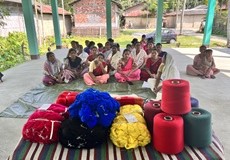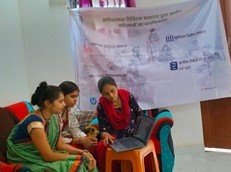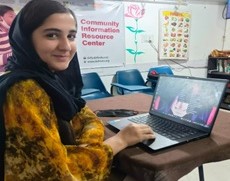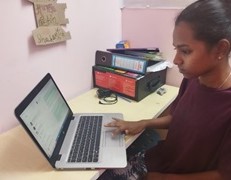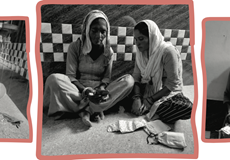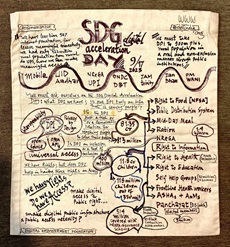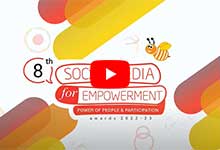

Across the globe, and particularly within the vibrant landscape of our interconnected world, the task at hand is not merely to keep pace with the ever-changing digital landscape but to empower the next generation to shape its contours. Empowering them to harness this digital dynamism is the key to unlocking unprecedented innovation and progress. Read More


In 2016, the United Nations Human Rights Commission declared internet access a basic human right. Not surprisingly, India was among the 17 countries that strongly opposed this resolution. The country continues to be the largest violator of internet rights, executing at least 84 shutdowns in 2022. Internet shutdowns are the legal pause to internet services, which immediately impact the citizens in a particular location as almost all the day-to-day activities in the modern world are integrated into a digital world. While some internet shutdowns are brief, for example, the state of Rajasthan in India has shut down the internet to prevent cheating in exams at a district level, some are longer. India had the longest internet shutdown after the bifurcation of Jammu, Kashmir and Ladakh due to the abrogation of Article 370. It lasted for 552 days. India is witnessing yet another prolonged internet shutdown in Manipur, where the internet was turned off on May 3 following a conflict that quickly turned into civil strife, primarily fuelled by hostilities between two communities in the state, Meiteis and Kukis. The reality of the conflict is yet to see the light of day due to a heavy crackdown on independent media, compounded by language and geographical barriers. As of July 4, the Manipur government has reported that 142 people have been killed due to the violence involving the Meitei and Kuki communities. Read More


SoochnaPreneur Business Mitra (SBM) Centers in interior villages of Assam have been set up to enable the rural women to scale up their activities from livelihood to entrepreneurship. With this vision in mind, Ms Sajiya Choudhury, a SBM running a digital service and business facilitation center in Malibari Village of Bihdia Jajikona Block in rural Kamrup of Assam, has reached out to a collective of 30 women who are engaged in handloom value chain. She has started to pilot business counselling services from her center and having identified the need of these women for the availability of good quality yarn at affordable prices, she has envisioned establishing a yarn bank at her SBM center. Read More
My name is Saksham, and I am currently a 10th-grade student. While I excel in my academic pursuits, my proficiency in using computers has always been a challenge. Fortunately, the lessons we get in DigiLamp Centers on digital literacy have been impactful. I also got to learn a lot from our digital literacy teacher, Ms. Shivani Thakur. She told us digital literacy extends beyond merely using computers or mobile devices. In today’s world, digital media has become ubiquitous – it’s all around us. Whether we’re scrolling through our phones or opening our laptops every morning, we are constantly immersed in the digital realm. This means that digital literacy skills are essential for any person who wants to succeed in today’s world. Read More

Divya got connected to the Digital Empowerment Foundation through Shahida, an Infopreneur working with DEF. Divya’s journey began with her quest for digital literacy. With Shahida’s support she started understanding how a smartphone works. What once seemed like a complex array of functions now started making sense to her. The empowerment that came with comprehending the operations of her device brought her immense satisfaction. The next step was to create her own email address; she learnt how to use Gmail and created her own account. She even learned to make online payments, something that she was especially reluctant about because she had heard about frauds. Read More
We came to know about this centre about a year ago. When we visited we saw that it offers computer training for people of all ages. Mukesh sir, the SoochnaPreneur who runs this centre introduced us to the centre and told us all about it. We were very excited so we immediately enrolled ourselves in the program. Over the past year we have learnt many skills and while writing this essay we decided that the best way to present our learnings would be with bullet points: Mobile Device Basics: Switching a mobile phone on and off, Mobile Photography: How to focus, how to adjust the lighting, how to choose the right settings and so much more. This has really helped us; photography is a new avenue for us to express ourselves and also cherish our memories. Read More
Muzhgan, a 17-year-old girl from Afghanistan migrated to India in 2021 with her family. It was difficult for her to adjust in India as it was a different culture but she tried. She was unable to continue her education until a few months ago when she joined the digital literacy program at the SoochnaPreneur centre in her locality. Even though she previously had very little interaction with computers she knew the importance that digital education would play in her life. In the last three months she has learnt the basics of computers. She learnt MS Paint and even designed some posters and book covers using that. In MS Word she learnt how to make her resume and this is going to help her find a job after finishing the course. In MS Excel she has learnt how to make invoices, tables and forms. Read More
Jacklin Mary, a resident of Lakshman Rao Nagar, Bangalore was introduced to basic computer operations in her school. Though she gained exposure to computers, she didn’t have one at home so she couldn’t continue her computer education after school. After graduating from school she joined the Digital Excellence Centre (DEC) in her neighbourhood and enrolled herself in the digital literacy course. The digital literacy course includes Microsoft Excel, Word, Typing and the fundamentals of computers. Along with digital literacy, the excellence centre also hosts activities that expand the creativity of youngsters. Science experiments have been designed to engage students and help them think creatively and logically. Read More

Danish, a 22-year-old from Kupwara, had been searching for a job since graduating from school. Unfortunately due to the stigma attached to his disability he was unable to secure a job. Coming from an economically backward family, he was responsible for providing financial support to his family. His father, a farmer, is sick because of which he is unable to earn a livelihood. Saba, DEF’s coordinator in Kupwara met Danish and provided digital literacy training to him. A few months later DEF introduced the Samarth SoochnaPreneur program that enables persons with disabilities to become digital entrepreneurs who provide access to information, digital literacy, health and livelihood to their communities. Read More

Nestled in the village of Bakhtai ki Chowki, Meena is a resident who lives with her husband and 2 children. Her humble home in the village doubles as a shop where she sells goods for women in her community like dresses, accessories and she also does tailoring for women. The constant effort of her family and her dedication to her family’s well-being is evident in the consistent monthly income of 25-30k rupees that the family earns every month. Meena is a woman breaking down gender norms and restrictive gender roles, and fostering change within her community. She has been working with Digital Empowerment Foundation for the past three years, and has participated in many programs that are run by the organisation in her community. Read More
In the village of Batesra in Alwar, Rajasthan, resides Sapita with her parents-in-law, husband and three children. Belonging to a modest family, she is heavily reliant on her husband’s income that comes through working on the hills. Despite financial constraints, Poonam ji, who is a Digital Didi, came to her home committed to dispelling myths and transforming traditional practices surrounding menstruation. Poonam ji’s visit was a turning point as she indulged in a discussion about menstruation, aimed at breaking the shackles of misconceptions surrounding it. These programs have made her a known face in her village, earning the trust and respect of the community members, Read More

The project aims to study and address economic diversification options in coal-dependent regions of Jharkhand, India as the transition from coal would necessitate substantial support for the workers and communities living in these areas. This involves assessing the skill sets of the people in these areas and working with various stakeholders to develop economic diversification plans that promote a just transition to non-fossil fuel-based economies. The project uses field research and engagement with key stakeholders to advance these diversification efforts. The pilot survey marked the project’s starting point. It was pivotal in refining the questionnaire and ensuring data accuracy. The insights from the pilot study guided the researchers in revising the questionnaire collaboratively. Read More
The G20 Conference concluded recently in New Delhi, under India's presidency with several accolades and a handful of criticism. This week we analyse the event for what it entails for digital public infrastructure. One of the points the preamble of the G20 New Delhi Leaders' Declaration commits to: Improve access to digital services and digital public infrastructure, and leverage digital transformation opportunities to boost sustainable and inclusive growth. Last year, before the G20 presidency was handed over to India, World leaders had met in Bali, and released a compendium which included a case study for alternative digital infrastructure, where DEF's model was cited as an example. Considering community networks and PM WANI initiative of India as a case study, the report goes on to acknowledge the financing gap in the sector and how CNs as options to attempt bridge the digital divide are important, and mentions our role in this process: "several organizations in India had been working on community networks for several years before the establishment of PM-WANI. Read More
Two years ago, as Ukraine witnessed an invasion by a larger and more organised Russia at the border, we witnessed the world pour in support in different ways. We also witnessed, as with most major polarising events, from elections to pandemics, an array of propaganda and disinformation, carefully coordinated and sharply targetted. From livestreams of the war that were actually video-game footages to sanctions on education, information that hurt the citizens more than those waging war, and laws on fake news that borders on censorship, we had talked about it back then: Now, last week, on October 7, as the area witnessed the "Al Aqsa Flood," a new barrage has broken in the tension-filled region of the Middle East. The world, just as it was with the Ukraine invasion, is heavily polarised with the recent developments. And the developments are bloody. The Palestinian group that is in power in the Gaza strip has launched several rockets into its bordering areas -which is deemed by them as "occupied territory". Read More


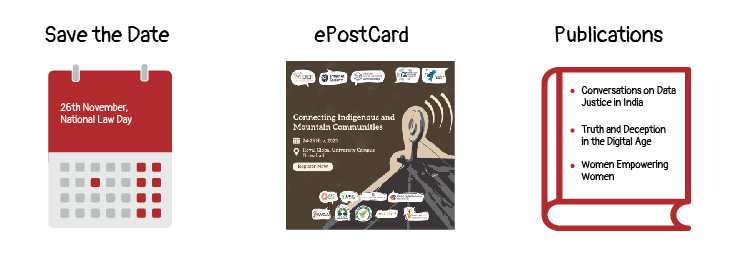

Connecting the Indigenous Communities of Ziro Valley project addresses the digital divide in the Ziro Valley, Arunachal Pradesh, and strives to connect rural and remote areas, which have been historically deprived of essential services and connectivity.
The project's achievements include establishing Wi-Fi Internet connectivity and enabling access to online services across education, skills development, health, government entitlements, schemes, and jobs. It has also set up a digital resource centre and deployed internet connectivity to 10 villages in the valley, reaching over 1000 households.

Discover the transformative impact of the SAKSHAM project in West Bengal, led by Swaniti Initiative and Digital Empowerment Foundation. Uncover the key findings from Swaniti's baseline study, revealing challenges faced by tea garden workers in accessing government 'Social Protection' schemes. Witness the initiative's strides in addressing issues such as Aadhar card discrepancies, lack of caste certificates, and slow government processes. With 1309 Aadhar corrections, 1000 scheme linkages, and a total withdrawal of INR 500,000 from MiniATMs, SAKSHAM is paving the way for positive change, empowering communities, and enhancing the efficiency of social welfare programs." Read More
We are expanding our reach to serve the most marginalized communities across India. Donate to our Digital Daan initiative and help us expand to unreached and unconnected communities.
info@defindia.org
You are receiving our newsletter because you opted-in for the purpose of receiving Digital Footprints, a monthly newsletter on digital development. If you wish to withdraw your consent and stop hearing from us, simply click here to unsubscribe


